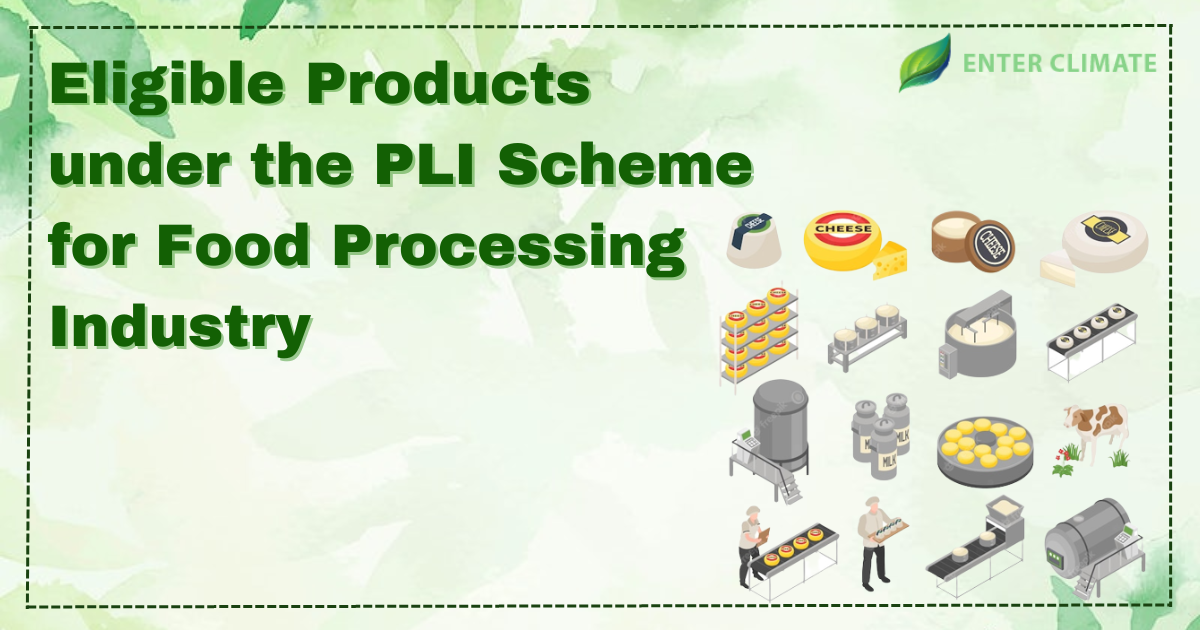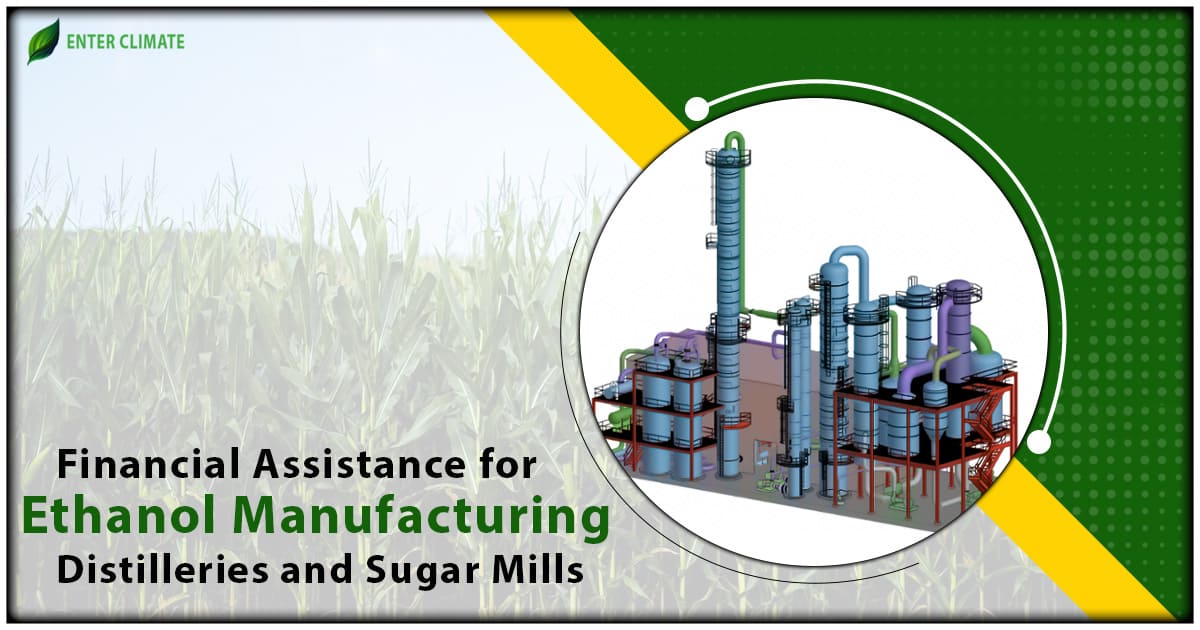Eligible Products under the PLI Scheme for Food Processing Industry (PLISFPI)
 22 Jun, 2023
22 Jun, 2023 
The food processing industry in India comprises manufacturing businesses of various sizes, ranging from small-scale to large-scale enterprises. India possesses certain advantages, such as abundant resources, a large domestic market, and opportunities for promoting value-added products, which give it a competitive edge. To fully uncover the potential of this sector, Indian companies need to enhance their competitive strength compared to their global counterparts. This includes improving the scale of production, productivity, value addition, and their integration with the global value chain. The PLI Scheme for Food Processing Industry has been developed based on the Production Linked Incentive scheme of NITI Aayog as part of the “Aatma Nirbhar Bharat Abhiyaan for Enhancing India’s Manufacturing Capabilities and Enhancing Exports.”
Objectives of the PLI Scheme for Food Processing Industry
The Production Linked Incentive Scheme components are as follows:
- Support food manufacturing entities with minimum sales and investment for capacity expansion and branding abroad
- Support the creation of global food manufacturing champions
- Strengthen select Indian brands for international visibility and acceptance
- Increase employment opportunities and ensure better prices for farmers’ produce
Salient features of the PLI Scheme
The Salient Features of The Production Linked Incentive Scheme components are as follows:
- incentivizing manufacturing in four major food product segments
- Innovative/organic products of SMEs in the covered segments.
- Selected applicants must invest in plant and machinery as quoted in their application.
- Investments made in the previous year can also be counted.
- No minimum sales and investment requirements for entities producing innovative/organic products.
- Support provided for branding and marketing activities abroad, including in-store branding, shelf space renting, and marketing.
- The scheme was implemented over a six-year period from 2021-22 to 2026-27.
Eligibility Criteria for Different Categories of Applicants
The Eligibility criteria for different Categories of Applicants as per the PLI Scheme for Food Processing Industry are as follows:
Category-I:
- RTE/RTC: Minimum sales of Rs 500 crore, minimum investment of Rs 100 crore
- Processed Fruits & Vegetables: Minimum sales of Rs 250 crore, minimum investment of Rs 50 crore
- Marine: Minimum sales of Rs 600 crore, minimum investment of Rs 75 crore
- Mozzarella Cheese: Minimum sales of Rs 150 crore, minimum investment of Rs 10 crore
- MTPD Plant: Rs 23 crore investment
Category-II:
- Udyog Aadhar/Udyami registered
- Minimum sales of Rs 1 crore for each innovative/organic product proposed as an incentive
- Organic product applicants must be registered with APEDA[1]
Category-III:
- Only Indian brands selling food products manufactured in India
- Branding and marketing to be undertaken by the applicant, subsidiary, or other agency
Components of the PLI Scheme for Food Processing Industry
The Production Linked Incentive Scheme components are as follows:
- First component: Incentivizing manufacturing of Ready to Cook/Ready to Eat, Processed Fruits & Vegetables, Marine Products, and Mozzarella Cheese
- Second component: Incentivizing innovative/organic products, including Free Range of Eggs, Poultry Meat, and Egg Products, across all four segments
- Third component: Support for branding and marketing abroad to promote strong Indian brands
Applicant categories for the PLI Scheme for Food Processing Industry
Central Sector Scheme approved by the Cabinet with an outlay of Rs. 10,900 crores. The applicant categories in the Production Linked Incentive Scheme are as follows:
| Category-I | Category-II | Category-III |
| Large entities applying for incentives based on sales and investment criteria can undertake branding and marketing activities abroad | SMEs manufacturing innovative/organic products applying for PLI incentives based on sales | Applicants solely seeking incentives for branding and marketing activities abroad |
Strategy and Targets for the PLI Scheme for Food Processing Industry
- The scheme will be introduced nationwide in India.
- A Project Management Agency (PMA) will handle the scheme’s implementation.
- The PMA will assess applications/proposals, verify eligibility, and scrutinize claims for incentive disbursement.
- The incentive will be paid for six years until 2026-27, with each year’s payment made in the following year.
- The scheme’s duration is from 2021-22 to 2026-27, and it has a fixed fund limit.
- The maximum incentive for each beneficiary will be predetermined and cannot be exceeded.
- By 2026-27, the scheme aims to expand processing capacity, generating processed food output worth Rs 33,494 crore and creating approximately 2.5 lakh job opportunities.
Administrative and Implementation Mechanisms
The administrative and implementation mechanism is as follows:
- The Empowered Group of Secretaries, led by the Cabinet Secretary, will monitor the scheme at the central level.
- The Inter-Ministerial Approval Committee (IMAC) will approve the selection of applicants, fund allocation, and incentive disbursement.
- The Ministry will create an Annual Action Plan outlining various activities for scheme implementation.
- The program will include a third-party evaluation and a mid-term review mechanism.
Application
The application process for availing benefits under the PLI Scheme for Food Processing Industry is as follows:
- EOI will be released in the first three years (2021-22, 2022-23, and 2023-24) for Category-II SME Applicants (innovative/organic products) for Sales-based Incentives and Category-III Applicants for Branding & Marketing. Based on fund availability, their coverage will extend until March 31, 2027.
- Depending on the applicant’s response and fund availability, the Ministry of Food Processing Industries (MoFPI) will consider releasing further EOIs.
- The EOI will specify the application window, and no applications will be accepted after its closure.
- Applicants must submit their applications using the prescribed Application Form given in the official notification.
- Applicants must identify their own manufacturing sites and contract manufacturers’ sites for sourcing eligible manufactured products for sale.
- Applicants must provide an undertaking consenting to the audit of their manufacturing sites/offices for verification purposes.
- The PMA will conduct an examination of applications based on the provided checklist within 15 working days of receipt. Incomplete applications will be notified to the applicants, who will have 10 working days to complete them, or else they will be rejected.
- A non-refundable application fee is Rs 1,00,000 for Category-I, Rs 10,000 for Category-II, and Rs 10,000 for Category-III SME Applicants and Rs 50,000 for other Applicants.
Online Portal for Application under the PLI Scheme for Food Processing Industry
- All applications must be submitted through the PMA’s online portal.
- After successful submission, the PMA will issue a unique Application ID for future reference.
- A web-based Management Information System (MIS) should be implemented by the PMA for online project monitoring and interim corrective measures, if necessary.
Documents Required for Availing PLI Scheme for Food Processing Industry
- Business Details such as Address, phone, email, PAN, nature of current business, turnover, net worth, and experience.
- Copy of the memorandum and articles of association or equivalent registration document, Partnership Deed
- Self-certified copies of Annual Reports, including Annual Financial Reports along with schedules, audited and complete Balance Sheet, as the case may be, for 3 years.
- Profit before Tax (PBT) and Profit after Tax (PAT) – (last 3 years)
- Self-certified copies of PAN, GST Certificate for the applicant,
- Self-certified copies of brief profiles of the Chairman, CEO, CXOs, Promoter and
- Key Managerial Persons, along with their PAN / DIN
- Key Personnel Details: Contact details of three senior employees of the applicant. (Name, Designation, Address, phone, email etc.).
- Credit History
Conclusion
The scheme aims to boost sales, encourage innovation, and enhance the sector’s competitiveness. Eligible product segments include grains, sugar, edible oils, beverages, dairy products, processed fruits, juices, pulses, guar gum, groundnuts, milled products, cereal preparations, oil meals, and alcoholic beverages. By providing financial incentives and support, the PLISFPI scheme aims to stimulate growth, attract investments, and drive employment opportunities in the food processing sector, ultimately contributing to the overall development of the industry and the economy. Implementation of the scheme will result in expanded processing capacity, producing processed food output valued at Rs 33,494 crore. By 2026-27, the scheme aims to create employment opportunities for approximately 2.5 lakh individuals. To apply and register through this Production Linked Incentive Scheme, it is recommended to take expert guidance to avoid errors and comply with all the regulations in a hassle-free manner.
FAQ
To qualify for the PLI scheme in the food processing sector, an applicant must have food product sales exceeding the minimum achieved in the base year. Food products encompass those sold in consumer packs and include the four specified segments.
The key sectors comprising the food processing industry in India are grains, sugar, edible oils, beverages, and dairy products.
India’s food processing sector has emerged as a thriving industry recently. Notable processed food products exported from India include processed fruits, juices, pulses, guar gum, groundnuts, milled products, cereal preparations, oil meals, and alcoholic beverages.
The Production Linked Incentive Scheme aims to support the creation of global food manufacturing champions, promote Indian brands of food products, increase employment opportunities for off-farm jobs, and ensure remunerative prices of farm produce and higher income to farmers.
The Production Linked Incentive Scheme for Food Processing Industry has been developed based on the Production Linked Incentive scheme of NITI Aayog as part of the “AatmaNirbhar Bharat Abhiyaan for Enhancing India’s Manufacturing Capabilities and Enhancing Exports.”
Read our Article: How To Apply For A Pollution Board License For Food Processing Units?
Categories
Latest Post
Air pollution Dispersion Modeling
Natural Disaster Risk Assessment
Endangered Species Protection
Aquifer Recharge Project
Sustainable Sanitation Solutions














